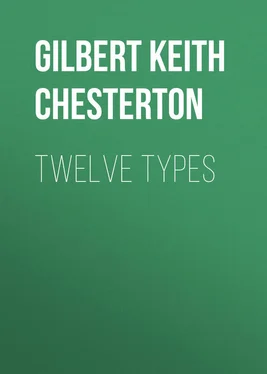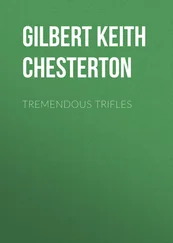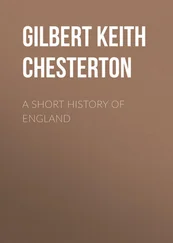Gilbert Chesterton - Twelve Types
Здесь есть возможность читать онлайн «Gilbert Chesterton - Twelve Types» — ознакомительный отрывок электронной книги совершенно бесплатно, а после прочтения отрывка купить полную версию. В некоторых случаях можно слушать аудио, скачать через торрент в формате fb2 и присутствует краткое содержание. Жанр: foreign_antique, foreign_prose, на английском языке. Описание произведения, (предисловие) а так же отзывы посетителей доступны на портале библиотеки ЛибКат.
- Название:Twelve Types
- Автор:
- Жанр:
- Год:неизвестен
- ISBN:нет данных
- Рейтинг книги:5 / 5. Голосов: 1
-
Избранное:Добавить в избранное
- Отзывы:
-
Ваша оценка:
- 100
- 1
- 2
- 3
- 4
- 5
Twelve Types: краткое содержание, описание и аннотация
Предлагаем к чтению аннотацию, описание, краткое содержание или предисловие (зависит от того, что написал сам автор книги «Twelve Types»). Если вы не нашли необходимую информацию о книге — напишите в комментариях, мы постараемся отыскать её.
Twelve Types — читать онлайн ознакомительный отрывок
Ниже представлен текст книги, разбитый по страницам. Система сохранения места последней прочитанной страницы, позволяет с удобством читать онлайн бесплатно книгу «Twelve Types», без необходимости каждый раз заново искать на чём Вы остановились. Поставьте закладку, и сможете в любой момент перейти на страницу, на которой закончили чтение.
Интервал:
Закладка:
WILLIAM MORRIS AND HIS SCHOOL
It is proper enough that the unveiling of the bust of William Morris should approximate to a public festival, for while there have been many men of genius in the Victorian era more despotic than he, there have been none so representative. He represents not only that rapacious hunger for beauty which has now for the first time become a serious problem in the healthy life of humanity, but he represents also that honourable instinct for finding beauty in common necessities of workmanship which gives it a stronger and more bony structure. The time has passed when William Morris was conceived to be irrelevant to be described as a designer of wall-papers. If Morris had been a hatter instead of a decorator, we should have become gradually and painfully conscious of an improvement in our hats. If he had been a tailor, we should have suddenly found our frock-coats trailing on the ground with the grandeur of mediæval raiment. If he had been a shoemaker, we should have found, with no little consternation, our shoes gradually approximating to the antique sandal. As a hairdresser, he would have invented some massing of the hair worthy to be the crown of Venus; as an ironmonger, his nails would have had some noble pattern, fit to be the nails of the Cross. The limitations of William Morris, whatever they were, were not the limitations of common decoration. It is true that all his work, even his literary work, was in some sense decorative, had in some degree the qualities of a splendid wall-paper. His characters, his stories, his religious and political views, had, in the most emphatic sense, length and breadth without thickness. He seemed really to believe that men could enjoy a perfectly flat felicity. He made no account of the unexplored and explosive possibilities of human nature, of the unnameable terrors, and the yet more unnameable hopes. So long as a man was graceful in every circumstance, so long as he had the inspiring consciousness that the chestnut colour of his hair was relieved against the blue forest a mile behind, he would be serenely happy. So he would be, no doubt, if he were really fitted for a decorative existence; if he were a piece of exquisitely coloured cardboard.
But although Morris took little account of the terrible solidity of human nature – took little account, so to speak, of human figures in the round, it is altogether unfair to represent him as a mere æsthete. He perceived a great public necessity and fulfilled it heroically. The difficulty with which he grappled was one so immense that we shall have to be separated from it by many centuries before we can really judge of it. It was the problem of the elaborate and deliberate ugliness of the most self-conscious of centuries. Morris at least saw the absurdity of the thing. He felt that it was monstrous that the modern man, who was pre-eminently capable of realising the strangest and most contradictory beauties, who could feel at once the fiery aureole of the ascetic, and the colossal calm of the Hellenic god, should himself, by a farcical bathos, be buried in a black coat, and hidden under a chimney-pot hat. He could not see why the harmless man who desired to be an artist in raiment should be condemned to be, at best, a black and white artist. It is indeed difficult to account for the clinging curse of ugliness which blights everything brought forth by the most prosperous of centuries. In all created nature there is not, perhaps, anything so completely ugly as a pillar-box. Its shape is the most unmeaning of shapes, its height and thickness just neutralising each other; its colour is the most repulsive of colours – a fat and soulless red, a red without a touch of blood or fire, like the scarlet of dead men's sins. Yet there is no reason whatever why such hideousness should possess an object full of civic dignity, the treasure-house of a thousand secrets, the fortress of a thousand souls. If the old Greeks had had such an institution, we may be sure that it would have been surmounted by the severe, but graceful, figure of the god of letter-writing. If the mediæval Christians had possessed it, it would have had a niche filled with the golden aureole of St Rowland of the Postage Stamps. As it is, there it stands at all our street-corners, disguising one of the most beautiful of ideas under one of the most preposterous of forms. It is useless to deny that the miracles of science have not been such an incentive to art and imagination as were the miracles of religion. If men in the twelfth century had been told that the lightning had been driven for leagues underground, and had dragged at its destroying tail loads of laughing human beings, and if they had then been told that the people alluded to this pulverising portent chirpily as 'The Twopenny Tube,' they would have called down the fire of Heaven on us as a race of half-witted atheists. Probably they would have been quite right.
This clear and fine perception of what may be called the anæsthetic element in the Victorian era was, undoubtedly, the work of a great reformer: it requires a fine effort of the imagination to see an evil that surrounds us on every side. The manner in which Morris carried out his crusade may, considering the circumstances, be called triumphant. Our carpets began to bloom under our feet like the meadows in spring, and our hitherto prosaic stools and sofas seemed growing legs and arms at their own wild will. An element of freedom and rugged dignity came in with plain and strong ornaments of copper and iron. So delicate and universal has been the revolution in domestic art that almost every family in England has had its taste cunningly and treacherously improved, and if we look back at the early Victorian drawing-rooms it is only to realise the strange but essential truth that art, or human decoration, has, nine times out of ten in history, made things uglier than they were before, from the 'coiffure' of a Papuan savage to the wall-paper of a British merchant in 1830.
Читать дальшеИнтервал:
Закладка:
Похожие книги на «Twelve Types»
Представляем Вашему вниманию похожие книги на «Twelve Types» списком для выбора. Мы отобрали схожую по названию и смыслу литературу в надежде предоставить читателям больше вариантов отыскать новые, интересные, ещё непрочитанные произведения.
Обсуждение, отзывы о книге «Twelve Types» и просто собственные мнения читателей. Оставьте ваши комментарии, напишите, что Вы думаете о произведении, его смысле или главных героях. Укажите что конкретно понравилось, а что нет, и почему Вы так считаете.










